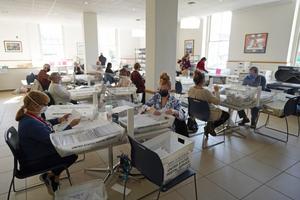Spotlight PA is an independent, non-partisan newsroom powered by The Philadelphia Inquirer in partnership with PennLive/The Patriot-News, TribLIVE/Pittsburgh Tribune-Review, and WITF Public Media. Sign up for our free newsletters.
HARRISBURG — Inside the spacious exhibition center at the York Fairgrounds, dozens of county employees on Tuesday sorted through thousands of mail ballots in the lead-up to the close of polls.
If they came across “naked ballots,” or ballots that lacked a secrecy envelope, they alerted the political parties. The parties could then contact voters, tell them there was a problem, and urge them to fix it.
But in neighboring Dauphin and Lancaster Counties, voters who mailed in naked ballots, or made some other error, will never get the chance to fix them, because officials there believe the law does not allow them to do anything but reject ballots that contain mistakes.
As Pennsylvania’s 67 counties began the painstaking process of processing and counting more than 2.5 million mail ballots, whether or not voters were given a chance to fix errors and ensure their votes were counted depended largely on where they lived.
That inconsistency is now at the heart of an eleventh-hour lawsuit filed Tuesday by a group of Republican candidates and voters seeking for counties to set aside any ballots that voters were allowed to fix.
In the lawsuit, filed in state Commonwealth Court, Republicans claim the state’s top election official, Kathy Boockvar, gave counties faulty guidance when she told them they could share information with political parties about voters whose ballots had problems. That information allowed the parties to track down voters and urge them to take action to ensure their vote is counted.
Boockvar’s guidance, they contend, “is in clear contravention” of both state law and a recent decision by Pennsylvania’s Supreme Court.
In that decision, a majority of justices ruled naked ballots must be rejected. But it was silent on whether counties could give voters a heads up about problems with their ballots. Under Pennsylvania law, counties could begin processing mail ballots at 7 a.m. on Election Day — meaning, they could open the envelope, ensure the ballot was sent correctly, remove it, scan it, and prepare it for counting.
Boockvar, asked about the lawsuit late Tuesday evening, said: “We don’t think we broke the law.” Though she said she did not want to comment on active litigation, she added: “I can tell you that the claims, we completely dispute.” It was unclear Tuesday exactly how many ballots might be in question, but Boockvar
Because far more Democrats voted by mail in the state compared to Republicans, any effort to fix mail ballots would probably benefit Vice President Joe Biden more than President Donald Trump.
Interviews with more than a half dozen counties Tuesday show that some contacted voters directly about problems they discovered when they started processing ballots.
Others gave the information to political parties so they could do the work of tracking down voters. Yet others, like Bucks County, began contacting voters even before Election Day, if they received ballots that they could tell were erroneous even without being able to pre-process — or pre-canvass — them.
Still other counties did nothing at all to alert voters of problem ballots, saying their read of state law and the state Supreme Court’s decision was that naked ballots, and ballots lacking signatures on the outer envelope, should be rejected outright without any remedy.
“We are not doing anything with them, at this point, until we get more direction from the state or the courts,” Chad Saylor, Dauphin County’s chief clerk, said of mail ballots received with deficiencies.
Saylor said county election officials had received between 500 and 750 ballots that had problems, the majority of them lacking the necessary secrecy envelope that is required for a ballot to count.
Though those accounted for just over 1% of the total mail ballots received, they could make a difference in some of the county’s close races.
Lancaster and Allegheny Counties took a similar approach, deciding not to alert voters about problems and instead setting aside naked and other deficient ballots. Lancaster County Commissioner Josh Parsons said the county was never instructed to reach out to voters to inform them of a problem.
“That is really not allowed by law,” Parsons said. “There is nothing in the election code about that or in the Pennsylvania Supreme Court ruling. The Supreme Court ruling was, set them aside.”
But in Erie County, workers with the Board of Elections spent part of their day Tuesday trying to track down voters to let them know they had submitted naked ballots. (Those voters had the option of going to their polling place to submit a provisional ballot.)
And in Luzerne County, count manager David Pedri said the county was telling political parties about problematic ballots, and the parties were then contacting voters.
In Bucks County, officials began reaching out to voters about faulty ballots several weeks ago. As mail ballots arrived, if they noticed a problem, such as a missing signature on the outer envelope, they would try to track those voters down to give them the opportunity to come in and rectify the problem.
Bucks County spokesperson Larry King said that as of Monday afternoon, the county had received nearly 200,000 mail-in and absentee ballots. Of those, officials had identified roughly 1,600 that lacked a signature or weren’t dated properly — and that number does not include any naked ballots they discovered on Election Day.
“We wanted to make sure we did anything we could to make sure people could correct their ballot,” said King.
Spotlight PA reporters Tom Lisi, Charlotte Keith, Ed Mahon, and Rebecca Moss contributed to this report.
100% ESSENTIAL: Spotlight PA relies on funding from foundations and readers like you who are committed to accountability journalism that gets results. For a limited time, become a member of Spotlight PA and your gift will be TRIPLED: spotlightpa.org/donate.
